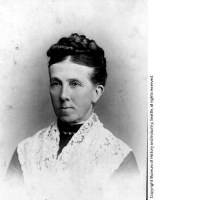
OBITUARIO
Louisa "Liza" Boren Denny
1 junio, 1827 – 18 agosto, 1916

Young Seattle pioneer who saved several of Seattle's earliest settlers from certain death. Louisa Boren was born on June 1, 1827, in White County, Illinois, to Richard and Sarah Boren. Her father, a young Baptist minister, died when she was an infant, leaving her widowed mother to raise three small children alone. Sarah later married John Denny, a widower with children of his own. As a student, young "Liza" loved learning and showed a natural aptitude for the "unfeminine" subjects of chemistry, philosophy, botany, and astronomy. As a young adult, the petite, black-haired beauty taught school. On April 10, 1851, the 23-year-old teacher headed for the Pacific Northwest with her extended family. She was the only unmarried adult female in the large group of pioneers. Upon eventually reaching the Columbia River, many of the Denny party members continued on by boat, one of which carried Liza, her sister Mary Ann Denny, their sister-in-law Mary Boren, friend Lydia Low, and seven children. It was around midnight when Liza heard the sound of a waterfall in the distance. Nearly everyone except the boatmen was sound asleep. The men, who had been drinking "Blue Ruin" all day, dismissed her fears at first, but finally moved to shore at her insistence. Once ashore, the stupefied men found that they indeed had come dangerously close to being swept over today's Cascade Falls. Perhaps this event, more than any other, is what convinced Liza to forever disavow drinking alcohol. As previously mentioned, she was the only unmarried adult female in the Denny party, but by the time they reached Portland on August 17, Liza and her step-brother David Denny were sweethearts. Prior to leaving her home in Illinois, Liza had bid goodbye to her friends and neighbors. She was in her beloved sweetbrier rose garden during one such tearful event, when she told her friend Pamelia that she would take some sweetbrier seed to "the Promised Land," to remind herself of the home she was leaving behind. After marrying David in 1853, Liza took the seeds she had carried over two-thousand miles and planted them outside their newly built cabin on what is now Denny Way, prompting some to call her the "Sweetbrier Bride." The sweetly fragrant plant, previously unknown in the Northwest, is now frequently found all along the shores of Puget Sound. While a lot of credit is justly given to the industrious men who settled the Seattle area, the brave women of those early times are often barely noted, if mentioned at all. We should be forever grateful to Liza and the many other pioneer women who endured great hardships to help make Seattle the great city that it is.
Muestre su apoyo
Comparta Un Recuerdo
Comparta
Un Obituario
Obtenga actualizaciones
Servicios
COMPARTA UN OBITUARIOCOMPARTA
- RECIBIR RECORDATORIOS
v.1.18.0